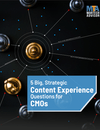Without context, data is just a collection of empty information. That’s where data blending comes in. By combining data streams from multiple sources, you can gain greater insights than you ever could looking at those sources in isolation. And those insights can be used to great effect in your search engine optimization efforts, writes, Daniel Page, Freelance, Writer.
Over the past several years, search engine optimization (SEO) has undergone a transformation. While tactics such as keyword research, backlinks, internal linking, and proper website architecture are still important, they are not the only thing you should be doing. And while quality long-form content is still every bit as critical to your success, it cannot guarantee it.

5 BIG STRATEGIC CONTENT EXPERIENCE QUESTIONS FOR CMOs
The future of effective content marketing is not in solutions that enable marketing teams to do the same activities with just more volume and efficiency
I know, I know. There’s no such thing as guaranteed success in the world of SEO. But there is a way to get as close to success as possible – a way that, provided you’ve got a bit of luck, you can climb the Search Engine Results Page (SERP) and bring in more prospects than ever before.
Also Read: Six Content Promotion Tactics to Fuel Your SEO Success
It all starts with deepening your understanding of your audience. Who they are, where they’re coming from, and how they engage with your content. And that’s not something you can do through the Google Search Console alone.
Instead, the path to deeper insights and a greater understanding of your audience lies in something known as data blending. In bringing together and contextualizing data-streams from every arm of your digital presence, including your social media accounts, review sites, your website, your web ads, and your storefront. Customers no longer interact with your brand through a single channel.
To truly understand a customer’s journey through your sales funnel, you need greater visibility. Data blending provides that. And in so doing, it offers you the necessary insights to further refine and adjust your SEO efforts.
Consider, for example, the following customer journey.
- A customer sees a Facebook ad about your brand while browsing the site on their smartphone. They don’t click on it, but they make a mental note to look you up later.
- Now on their desktop, they search for your brand and access your site through the SERP. They read a few posts on your blog before bouncing.
- A day later, they visit your site on their smartphone and make a purchase through your digital storefront.
If you viewed each of your monitoring tools in isolation, you’d have to rely on your own instincts to determine that these three events were all part of a single customer’s journey. Given the sheer volume of data you’d be sifting through, it’s unlikely you’d make the connection.
Through data blending, the connection can be made for you – it automates the process of compiling, collating, and analyzing your data-streams, and generates actionable insights that you can then leverage to improve.
Google actually provides this functionality through a tool known as Google Data Studio. Although it requires a bit of manual work on your part – it cannot automatically pull information from platforms like Facebook Insights – it’s definitely worth using. As explained in SEO and marketing publication Search Engine Land, it can give you direct knowledge of factors you might otherwise overlook, and add them to a report alongside other SEO metrics.
Also Read: APIs are Making SEO Analytics Less Burdensome
These include, but are not limited to:
- Conversion and revenue data
- Where the majority of your site’s traffic originates.
- Which pages on your site receive the most engagement and the factors that might contribute to this.
- Which pages on your site are shared most frequently on social media and the factors that might contribute to this.
- The reasons a particular page might be suffering a loss of traffic.
- Combined keyword data from Google, Facebook, and Twitter.
Basically, data blending provides a ton of valuable insights into your marketing efforts – of which SEO is a cornerstone. It adds greater context to your search data by combining it with information from across your entire ecosystem. And while it’s certainly possible to gain those insights yourself, doing so requires a ton of effort that’s best spent elsewhere.
